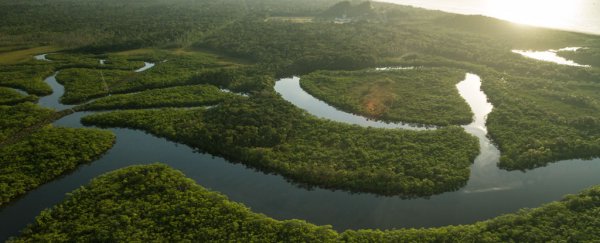Environmentalists are celebrating after a Brazilian court blocked an attempt by the country's president to allow mining in a massive protected reserve in the Amazon rainforest.
Brazilian president Michel Temer sparked outrage last week when he issued a decree abolishing a protected area called the National Reserve of Copper and Associates (aka Renca) to open the land up to commercial mining.
The move sparked condemnation around the world, with critics warning mining would hasten deforestation in species-rich rainforest and threaten the existence of native peoples who live in the jungle.
A senator opposing the abolition called it "the biggest attack on the Amazon of the last 50 years", and that might not be hyperbole – given the decree sought to dismantle legal protections set up around a forest area larger than whole European countries such as Denmark and Switzerland.
Renca covers some 46,000 square kilometres (approximately 17,800 square miles) in total, encompassing nine conservation and indigenous land areas, but that's not all that lies inside its boundaries.
The reserve is thought to be rich in copper, gold, iron ore, and other minerals – valuable resources that more than 20 mining companies are vying for, which is why the government was hoping to dismantle Renca's protected status established back in 1984.
"The objective of the measure is to attract new investments, generating wealth for the country and employment and income for society, always based on the precepts of sustainability," the government said in a statement explaining the initial decree.
But now it looks like the action has been suspended, after federal judge Rolando Valcir Spanholo ruled on Tuesday that Temer had gone beyond his presidential authority in causing the dissolution of Renca.
Approving an injunction to halt the abolition, the judge ruled that only Brazil's congress had the power to rescind Renca's protected status, meaning the presidential decree – at least for now – is ineffective and the protections are still in place.
The ruling came after a lawsuit filed by lawyer and university professor Antonio Carlos Fernandes, who decided to get involved after the controversy broke last week.
"I'm a regular citizen," he told reporters from The New York Times. "And now I have certainty that a regular citizen can have a lot of strength."
But despite the legal victory, Renca's stay of execution might only have been postponed temporarily, not cancelled.
Brazil's attorney-general has already appealed the decision, meaning the injunction could be overturned in subsequent rulings.
"The suspension of president Temer's unilateral decree with its severe threats to vast Amazonian forest offers a welcome and temporary reprieve," said program director Christian Poirier from non-profit Amazon Watch.
"Today's ruling upholds constitutional guarantees and puts the brakes on this drastic regression, but is ultimately vulnerable to being overruled by higher courts."
Prior to the decision in the case, Temer pivoted on Monday, issuing a second decree in response to the backlash the first provoked.
The new decree states that mining would be prohibited in indigenous areas and nature preserves within Renca, and sought to establish a committee to oversee mining permits.
Some commentators have criticised the clarifications for being a thinly veiled attempt at damage control, with environment minister Sarney Filho claiming "there was a lot of confusion in the way society as a whole perceived this decree".
It's not entirely clear how this will play out, and there may be more twists in the story before we know the ultimate fate of Renca – which some claim is already being encroached upon by illegal, clandestine prospecting.
For now, at least there's an injunction to protect this massive reserve from unprecedented, all-out exploitation.
After that, the picture is uncertain, but the world is definitely watching.
